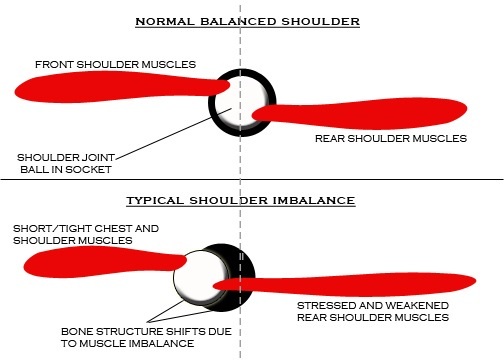Bench Pressing and Shoulder Pain
Many weightlifters complain of shoulder pain when doing the bench press. This complaint is usually addressed clinically with a systematic formula consistent of NSAIDs and rest, with an unspecific justification coming from physician and goes like: “You could be starting a Tendonitis!” – But what is Tendonitis anyway?
After finishing the NSAIDs course and the rest period, the story usually goes on with the pain reappearing – and sometimes worse than it began. Things will start going in the favor of the athlete when they go consult with a Sports Medicine doctor or a Physical Therapist specialized in Sports Medicine. These professionals will not only treat the symptoms, but they will look further into the cause of the injury – which eventually could get serious.
There are 3 main reasons for chronic shoulder pain and injuries:
- Poor mobility: often caused by tightness or dominance of the prime movers involving protraction, internal rotation & elevation of the shoulder (Pectoralis, Lattissimus Dorsi, Anterior Deltoid, upper Trapezius, Levator Scapulae, Serratus Anterior, Teres Major)
- Weakness of the scapular stabilizers: often the result of tight or dominant prime movers of the shoulder and/or simply weakness of the muscles involving retraction, depression & external rotation of the shoulder (middle & lower Trapezius, Rhomboids, Infra Spinatus, Teres Minor)
- Overuse of the Anterior Deltoid which is used during all chest and shoulder exercises.
A fourth reason could also be added which would be poor or inefficient neuromuscular coordination…
…but that could tie into the 3 reasons listed above.

This illustrates the famous Shoulder Impingement Syndrome associated with rotator cuff problems; but unless you pinpoint the muscle imbalances and restore proper form and function, neither the tendonitis nor the rolled shoulders will get resolved, on the contrary; things might get worse (think Rotator Cuff tears!)
The point is that experienced bench pressers tend to exhibit poor shoulder mobility and/or weakness of the scapular stabilizers to a larger degree – with obvious rolled shoulders – which is why they experience more cases of bench press shoulder pain.
Aside from eliminating the bench press, many try to limit the range of motion to 90 degrees or less of elbow flexion because it is believed that going past 90 degrees places excessive stress on the shoulders and increases the potential for injuries to occur.
There is also the belief that the shoulders become injured simply because they are weak and therefore many individuals attempt various rehabilitation exercises for the shoulder.
Here are some tips to prevent or help reduce this type of condition in its early stage:
- If you feel you have a problem with your shoulder, get it diagnosed and get a clearance from a Sports Medicine practitioner to continue weightlifting.
- Follow the IFPA Key Teaching Points (KTPs) for doing the bench press right!
- Take the time to warm up, stretch the pectorals and deltoids before and after your workout; the stretching should be longer at the end.
- Work the external rotation of the shoulder; these are very important exercises to help balance the shoulder joint. It should be done with low weights, high repetitions and released very slowly (the eccentric phase of the exercise is the most important!) Ask your personal trainer to demonstrate the proper way to execute this exercise.
- Ice your shoulder for 20 minutes after the workout.
- Consult with your Sports Medicine doctor or Sports Physical Therapist every 2 – 3 weeks to guide you through the next steps your program and to help you with the delicate techniques involving the Pectoralis Minor, Rhomboids, Levator Scapulae, etc.
- Allow 24-48 hours (or more depending on intensity) between chest and shoulder workouts.
Need a comprehensive flexibility program designed for you? Contact Philadelphia Certified Personal Trainer, Phil Nicolaou